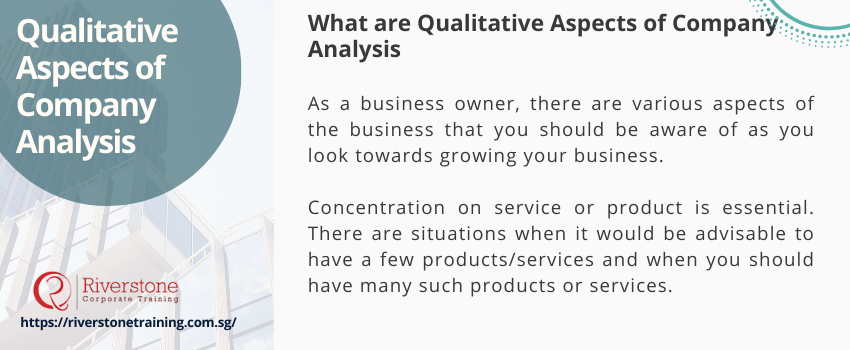
What are Qualitative Aspects of Company Analysis
Qualitative Aspects of Company Analysis:
As a business owner, there are various aspects of the business that you should be aware of as you look towards growing your business. To remain relevant, you will need to understand the bargaining power of your buyers.
“If they are low-income, then you must make your products affordable.”
Concentration on service or product is essential. There are situations when it would be advisable to have a few products/services and when you should have many such products or services. If the customers want a diversified portfolio, then you should meet this demand. On the other hand, you may choose to specialize in strong areas where you can produce select high-quality products/services. An example of qualitative aspects includes the morale of employees.
Qualitative vs. Quantitative
These are both important in decision making. The quantitative ones are measurable such as the return on investments, profitability, and sales figures. As for the qualitative, we look at reputation, brand and the morale of the employees. Approaches like decision-making through game theory help leaders strategically balance these measurable outcomes with intangible factors, especially in complex, competitive environments.
You may have come across some firms which over-rely on the foreign markets to drive their business. This is dangerous since these markets could slump, affecting the company. On the other hand, one should be open to healthy competition by knowing what your competitors are offering.
In line with the above, one must be open to endless possibilities. For instance, you can enter into merger deals or buy out of your competitor to reduce competition or streamline your operations. However, you must be aware of the fact that there every business operates in a regulated business environment. Some laws apply in various companies and therefore, you must understand how they are going to affect your ability to transact businesses.
Technology is changing very fast. There are innovations and patented ideas that are transforming the business environment. One must be aware of these changes and adjust accordingly. The failure to innovate has a direct or indirect effect on the business and this could explain why many companies become obsolete.
How Singaporean Investors Assess Management & Governance:
Write an online guide and a series of articles devoted to the specifics of the evaluation of the qualitative components of the management team of a company and corporate governance structure by investors and analysts in Singapore. It may discuss the topics like evaluation of leadership experience, succession planning, the independent position of the board, ethical conduct, and the rights of shareholders in accordance with the Singapore regulatory environment and business culture. Presenting your answers on the process of examining these so-called soft factors by the players operating on the local market place, you can give important and usable recommendations to the investors as well as to the companies seeking to receive capital or to withstand corporate popularity.
These insights are especially relevant for professionals who have completed a Singapore regulatory compliance certification course, as they are trained to identify governance practices aligned with statutory obligations. Additionally, organizations aiming to enhance credibility may benefit from corporate asset valuation training Singapore to better communicate their governance-linked value to investors.
Qualitative Factors Driving Success in Singapore’s Industries:
Create works that discuss the way in which qualitative aspects can help develop competitive advantage and long-term success of businesses of various industries in Singapore.
This might include the study on how powerful brand reputation leads the consumer preference in retailing—an area supported by professional brand valuation services in Singapore—how entrepreneurship culture leads to growth in technology startups, how effective supply chains create resiliencies in the manufacturing industry, or how customer relationship management creates loyalty in service industries. Additionally, the strategic measurement of non-physical business strengths, guided by intangible asset valuation experts in Singapore, provides actionable insight into value creation. It will be possible to illustrate the relevance of qualitative analysis in the dynamic Singapore economy by generating industry-specific instances and drawing strategic relevance of those non-quantifiable factors.


